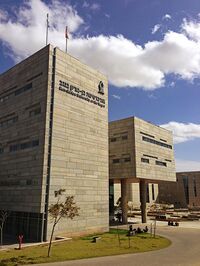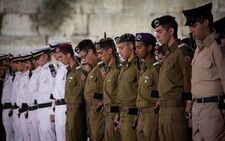Royal Yisraeli Political Academy system
This article is incomplete because it is pending further input from participants, or it is a work-in-progress by one author. Please comment on this article's talk page to share your input, comments and questions. Note: To contribute to this article, you may need to seek help from the author(s) of this page. |
מערכת אקדמיה פוליטית ישראלית | |
 | |
| Motto | גאָט, מלך, דוטי, כבוד |
|---|---|
Motto in English | God • King • Duty • Honor |
| Type | Secondary boarding political-military academy system |
| Established | 1881 |
| Affiliation | Judaism |
Officer in charge | Commandant (Brig. Gen.) Zalman Eyal Amari |
| President | Saloman Eisenstadt |
| Dean | Dr. Ilan Bar-Halevi |
Academic staff | 2,568 |
| Students | 14,693 |
| Location | , |
| Colors | Navy Blue and Gold |
| Nickname | "The Academy" "The Politicniks" |
The Royal Yisraeli Political Academy system (Modern Hebrew: מערכת אקדמיה פוליטית ישראלית), commonly called The Academy) is a system of state-sponsored secondary boarding political-military academies in Yisrael for men geared towards the training and matriculation of patriotic young men to enter public service, including the officer corps of the various service branches of the Defense Forces, the security and intelligence services, the regular and special police forces, or the general government bureaucracy. Its mission is to cultivate and prepare the next generation of Yisraeli political and civic leaders.
Overview
The Politicnik system has four separate campuses - Yerushalayim, Dervaylik, Ashkelon, and Beersheva - roughly corresponding to the largest cities in each corner of the country. The academies enroll close to 15,000 students - called "cadets" - as well as nearly 2,500 faculty and staff.
The academy system is considered a prestigious and elite honor, and it enrolls by general application as well as through nomination or legacy. The high-school-aged students are considered officers-in-training. There exists a quasi-military discipline, that varies depending on the track upper-level cadets pursue. The mission of the academy system is to produce political, governmental, military, business, and societal leaders that have a strong allegiance and patriotic fervor to the principles and values of the pillars and institutions of the Kingdom.
The academic program grants a bagrut certificate (high school diploma) with a curriculum that grades cadets' performance upon a broad academic program, military leadership performance, and mandatory participation in Torah study and competitive athletics.
Most graduates, depending on their track, graduate with a commissioned officer's rank.
Tracks
Beginning in their third-year, cadets have the option (and are strongly encouraged) to join a specific track that will limit their general studies and increasing give them comprehensive mandatory and elective courses in their chosen area.
General Track
The default track, for cadets unsure of which government or public service direction they wish to pursue. They have the ability, in addition to their general studies, to take as electives courses specific to other tracks. If they decline to select an alternate track, they graduate with their bagrut certificate being eligible to subsequently join any of the military officers corps, etc., of their choice, but they have lower priority in which field they look to enter compared to that track's body of graduates who specialized in its specific track.
Defense Forces Track
This track is an administrative legal fiction: cadets choose a Defense Forces military service branch directly; the academy system created this label to organize the Defense Force tracks from the other non-military tracks. Since 1969, cadets have also been eligible to "cross-commission", or request a commission in one of the other military services, provided they meet that service's eligibility standards. Every year, a very small number of cadets do this, usually in a one-for-one "trade" with a similarly-inclined cadet or midshipman at one of the other service branches.
The top 2% of each class are commissioned as first lieutenants. Foreign cadets are commissioned into the armies of their home countries. Most graduates matriculate as second lieutenants.
Army Track
Cadets specialize in preparation for service in the Royal Yisraeli Army. They learn military drills, Army strategy and tactics, military history, and small arms proficiency.
Air Force Track
Cadets specialize in preparation for service in the Royal Yisraeli Air Force. They learn military drills, Air Force strategy and tactics, military history, and flight proficiency. Third-years practice in flight simulators, but second-semester Fourth-years are permitted to practice in training planes.
Cadets specialize in preparation for service in the Royal Yisraeli Navy. They learn military drills, Navy strategy and tactics, military history, and small-arms and ship-mechanical proficiency. First-semester Fourth-years are permitted to practice navigation in motor boats.
Border Guard Track
Cadets specialize in preparation for service in the Royal Yisraeli Border Guard. They learn military drills, border security strategy and tactics, military history, and small-arms proficiency. They also are schooled in contraband- and fugitive- detection, as well as basic international relations and diplomacy. Second-semester Fourth-years are permitted to accompany serving border guards on frontier patrols.
Security and Intelligence Track
Cadets specialize in preparation for service in the Royal Yisraeli Security Service, Royal Yisraeli Intelligence Service, as Kafetim (political officers), or other smaller security and intelligence agencies. They learn introductory intelligence and counterintelligence strategy and tactics, historical secret services' history, and various intelligence-gathering techniques. Second-semester Fourth-years participate in what are termed "spy wars" where the track's cadets are split into the "spies" and "counterintelligence officers" camps and conduct mock intelligence operations. Their military routine and drilling is minimal, and more paramilitary to reflect their intended atmosphere.
The Kafetim subtrack are given more coursework on ideology, loyalty, and rhetoric theory.
Police Track
Cadets specialize in preparation for service in the regular Yisraeli police or in the special police forces. They learn introductory law enforcement and investigatory strategy and tactics, modern police history, various law-enforcement, detective, and investigatory techniques, and small arms proficiency. Second-semester Fourth-years are permitted to join the beat of police officers.
General Administration Track
Cadets specialize in preparation for service in the general government administration. As such, their military-style routine and drilling is minimal. They learn introductory and advanced concepts in political science, public administration, organizational theory, political history, and economics. Third- and Fourth-years hold every semester "mock Knesset" debates.
Business and Society Track
Cadets specialize in preparation for professional work in general society and business. As such, their military-style routine and drilling is minimal. They learn introductory and advanced concepts in a variety of business, economics, culture, society, religion, and other fields of study. Second-semester Fourth-year cadets are often permitted to visit networking events in their honor at leading Yisraeli companies and organizations.
Sociopolitical composition
The academy system is overwhelmingly composed of young men from the National Religious sector of society, who are strictly religious but also strong nationalists. A 2018 survey suggested that the RYPA cadets were made up of 68% National Religious & Chardal, followed by 18% Traditionalists, 5% Non-Zionist Religious Right, and 9% Nominal Religious.
